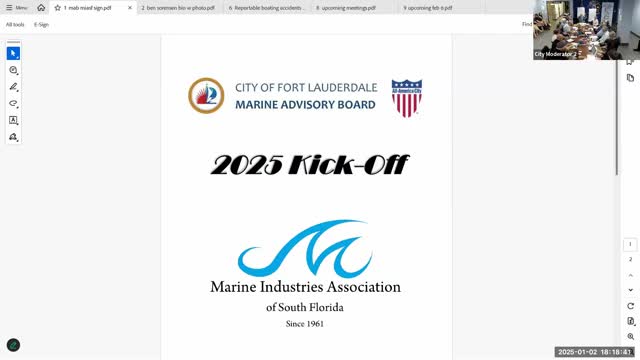Fort Lauderdale stakeholders set 2025 priorities: water quality, navigation safety and infrastructure funding
Get AI-powered insights, summaries, and transcripts
Subscribe
Summary
Commissioner Ben Sorenson and city staff told a Jan. 2 joint meeting of the Fort Lauderdale Marine Advisory Board and MISF that the city will pursue a mix of near-term actions on water quality and longer-term engineering work to preserve navigation and maritime jobs.
Commissioner Ben Sorenson and city staff told a Jan. 2 joint meeting of the Fort Lauderdale Marine Advisory Board and the Marine Industries Association of South Florida (MISF) that the city will pursue a mix of near-term actions on water quality and longer-term engineering work to preserve navigation and maritime jobs.
The meeting brought city commissioners and staff together with the U.S. Army Corps of Engineers, Coast Guard representatives, marine-industry leaders and environmental groups to translate broad goals — “clean water” and “safe navigation” — into measurable steps for 2025.
Why it matters: Fort Lauderdale’s waterways are central to local jobs and tourism, and stakeholders said failing to address recurring sewage discharges, derelict vessels and pinch points in the New River could threaten marine businesses and public safety.
“This is a major step for us,” Commissioner Ben Sorenson said of the city’s move to pursue federal funding for a preferred New River crossing; “the city commission… now says that a tunnel is the preferred local alternative, to crossing the New River.” He also told the group the city will ask the manager’s office to produce a cost estimate for the initial engineering required to apply for Federal Railroad Administration funding.
What stakeholders want now
- Water quality and monitoring: Dr. Nancy Gassman told the group that routine, ephemeral discharges from boats are difficult to measure and trace. Participants discussed expanding testing with Miami Waterkeepers (about 10 sites currently), adding source-tracing capability, and pilot projects such as living seawalls and sea-hive installations in partnership with universities. City staff said the manager’s office is reviewing suggested mangrove-planting sites.
- Pump-out capacity and mobile services: Multiple speakers, including Elise Zarbo of the U.S. Army Corps of Engineers, recommended expanding pump-out access. Zarbo described successful county programs that deploy pump-out vessels that visit boats at anchor rather than requiring boaters to come ashore. The board discussed mobile pump-out grants and a city role in subsidizing or permitting additional pump-out boats.
- Derelict-vessel removal and enforcement: Sergeant O’Neil reviewed procedural limits under state law for declaring vessels derelict and noted the 21‑day process and need for on-contract removal services. The city said it is working on a standing contract with fixed fees to remove derelict vessels more quickly once legal steps are complete.
- Illegal charters and pickup/drop-off rules: Police and Coast Guard representatives said illegal charter operators are a major enforcement challenge. The Coast Guard and Florida Fish and Wildlife Commission (FWC) have enforcement authority for illegal charters; city staff and police discussed licensing, business tax permits, and park/trespass enforcement for illegal pickups at public docks. Several participants urged a registry or permit and realistic civil penalties for unauthorized commercial pickups.
- Boat maintenance and shoreline runoff: Participants reiterated prohibitions on hull scraping and sanding over water, and discussed stronger requirements and education for commercial yards that perform hull work. Street runoff and sedimentation were identified as substantial contributors to canal shoaling.
Longer-term navigation and infrastructure
A substantial portion of the meeting focused on the commuter-rail crossing of the New River and on a recently completed bathymetric survey. Commissioner Sorenson and others urged pursuing Federal Railroad Administration (FRA) grant programs to fund engineering work that would support a tunnel alternative rather than a bridge, and asked the city manager to return with an initial engineering-cost estimate so the city can apply for FRA and other federal funds.
The MISF‑commissioned bathymetric work and an accompanying video were presented to illustrate pinch points along the New River where modern 30‑ to 150‑foot vessels navigate in tight channels. Industry representatives and Army Corps staff said dredging and channel maintenance are technically possible but costly, and that contaminated sediments in some areas raise disposal costs and regulatory hurdles.
What was not decided
The meeting did not adopt binding city policy beyond the existing city commission resolution favoring a tunnel as the local preference for the New River crossing. Many initiatives — expanded testing, pump-out vessel procurement, increased code fines or a phased dredging program — were framed as proposals needing specific budgets, inter-agency permitting, or state/federal approvals.
Ending note
Participants agreed to keep the joint board meetings regular, to share technical material including the bathymetric survey and navigation video, and to follow up on concrete steps (pump-out options, a protective dredging/cost plan, and an FRA grant application path) before the city commission and county bodies this month.
